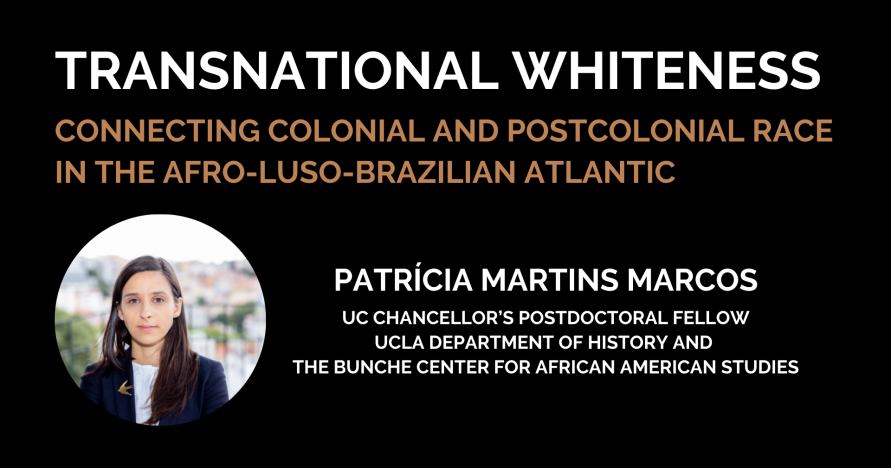
Transnational Whiteness
Connecting Colonial and Postcolonial Race in the Afro-Luso-Brazilian Atlantic
Tuesday, April 23, 4:00-5:30pm | Humanities Gateway 1030
Approaching Latin America hemispherically, this talk explores racial whitening as an early modern reality and the most central strategy to advance Portuguese imperialism. Treating racial formation relationally, this talk intervenes in studies of blood purity, race in Brazil, Atlantic slavery, and Portuguese settler colonialism in Africa. By focusing on how the extension of white status was the most strategic expedient deployed over centuries to advance Portuguese Atlantic colonialism, Martins Marcos places histories of indigeneity, anti-Arab, anti-Romani sentiment, antisemitism, anti-Blackness in dialogue within the broader context of Portuguese Atlantic settler colonialism.
Patrícia Martins Marcos is UC Chancellor’s Postdoctoral Fellow in UCLA’s Department of History and the Bunche Center for African American Studies. She is scholar of science, race, gender, sexuality, and settler colonialism studying both early modern and modern Portuguese imperialism in Africa and the Americas. Her work has been supported by the Huntington Library, the John Carter Brown, the Black Studies Project, The American Philosophical Society, and the Center for Black, Brown, and Queer Studies. Her book project, Imperial Whiteness: Population, Patriarchy, and Race in the South Atlantic (1600-1800) historicizes race (raça) in early modern Portuguese Atlantic imperialism, revealing how techniques of population whitening credited to modern, Latin American nation-building and eugenics were, instead, central to Portuguese settler colonialism and its methods of population management. She has published “Blackness out of Place” with the Radical History Review, and “Refusing the Fictions of Unmarked Whiteness” with Eighteenth Century Fiction.
The event is sponsored by the Department of History, the Department of African American Studies, the Department of Chicano/Latino Studies, the Department of Global Studies, and the Center for Latin American and Carribean Studies.
